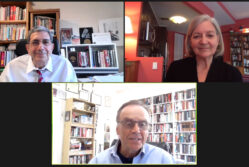
When Journalists Are Targets: Conflict Reporting After James Foley and Steven Sotloff
For freelancers reporting in conflict zones, life is hard and risky.
“This is the most deadly and dangerous period for the press in recent history,” Joel Simon, executive director of the Committee to Protect Journalists, told students and other attendees at the Columbia Journalism School on Sept. 9 during a panel about escalating risks to journalists.
The event, “After James Foley: Covering Conflict When Journalists Are Targets,” was arranged in response to the recent murders of Foley and Steven Sotloff, both freelancers who were abducted while working in Syria and executed by members of the Islamic State.
The numbers are chilling. Out of the 70 journalists killed in 2013, about a third were freelancers, a percentage that has doubled in recent years. The number of jailed journalists has broken records since 2012, Simon said.
Nearly 90 percent of journalists killed since 1992 were local journalists working in their own countries, he added.
Phil Balboni, GlobalPost CEO and co-founder, who spent years fighting for James Foley’s release, said when James Foley was abducted on Thanksgiving Day, 2012, his organization hired a security firm to handle the case, which in the end cost the company “millions of dollars.”
“I’ve seen major international news organizations walk away from their freelance reporters, even some who have been abducted. I think it’s appalling,” he said. “Somehow we need to get the leadership of news organizations to accept that it is kind of their moral responsibility to do that.”
Nicole Tung, a freelance conflict photographer and friend of Foley’s who first discovered him missing, spoke with difficulty while describing her colleague. “Jim was one of the best people that I knew, and it’s hard not to get choked up talking about him,” she said.
Tung described some of the hardships under which freelancers operate, working for small payoffs with scant support from their strings. She called on news organizations to better equip freelancers with satellite phones, flak jackets and insurance options.
She told the crowd of journalism students to make sure they make preparations at home before going into risky areas, like establishing secret “proof of life” questions with family or colleagues, and having a plan in case of kidnapping or detainment.
Reuters columnist and former New York Times reporter David Rohde, who was held captive for seven months in 2008 and 2009 by the Taliban before he escaped, echoed Tung’s advice.
“Have a conversation with your loved ones, talk about the reality of what will happen if you are kidnapped. Do you want a military raid to save your life? Do you want a ransom paid on your behalf to one of these jihadist groups?”
He painted a stark picture of life for family and friends of abductees.
“The bottom line is that your family is left on their own to somehow live in a world where they think they can save your life if they make the right decisions, but the cruel reality is that they can’t control what happens.”
This lack of control is pronounced for abducted American journalists, because the U.S. is one of only a few countries in the world that does not pay ransoms, even in secret.
OPC award winner, board member and New York Times foreign correspondent Rukmini Callimachi has reported on terrorist groups’ use of ransoms to fund their operations. She reported that countries or companies, particularly in Europe, pay tens of millions of dollars to recover a single abductee.
“Our citizens are now being doomed by the policies of what Europe does,” she said. “If (the U.S.) is going to hew to that stance, it seems that it behooves our government to at least put pressure on the Europeans to stop this.”
“And I have yet to see an American official and actually name the European countries that do this, even though behind closed doors they will name France and Spain and Italy and Austria and the others.”
The OPC co-sponsored the event with the Columbia Journalism School and the Dart Center for Journalism and Trauma.



